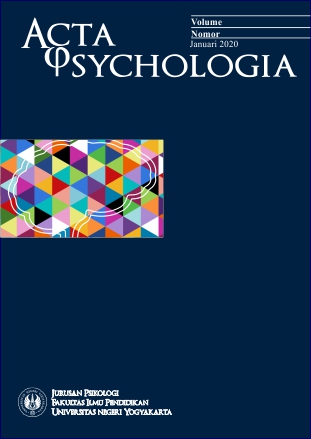Self-compassion sebagai prediktor perilaku promosi kesehatan pada mahasiswa
DOI:
https://doi.org/10.21831/ap.v5i2.72080Keywords:
Student, Health Promoting Behavior, Self-compassionAbstract
Self-compassion menjadi salah satu faktor penting dalam meningkatkan perilaku promosi kesehatan. Namun begitu, ditemukan bahwa perilaku promosi kesehatan mental mahasiswa rendah. Penelitian ini bertujuan untuk mengetahui apakah self-compassion mampu memprediksi perilaku promosi kesehatan pada mahasiswa di UNY. Penelitian ini menggunakan pendekatan kuantitatif dengan jenis survei. Sampel penelitian menggunakan metode unrestricted self-selected survey sampling dan diperoleh partisipan penelitian sebanyak 406 mahasiswa aktif S1 angkatan 2019-2022 di UNY. Instrumen penelitian menggunakan Self-Compassion Scale dan Health Promoting Lifestyle Profile II. Analisis data menggunakan analisis deskriptif dan analisis regresi linier sederhana pada masing-masing variabel. Hasil regresi menunjukkan bahwa self-compassion memprediksi perilaku promosi kesehatan secara signifikan (β = 0,439, p<,001). Self-compassion juga ditemukan mampu memprediksi seluruh dimensi perilaku promosi kesehatan.
References
Al Jauziyah, S. S., Nuryanto., Tsani, A. F. A., et al. (2021). Pengetahuan gizi dan cara mendapatkan makanan berhubungan dengan kebiasaan makan mahasiswa universitas diponegoro. Journal of Nutrition College, 10(1), 72-81.
Allen, A. B., & Leary, M. R. (2010). Self-compassion, stress, and coping. Social and Personality Psychology Compass, 4(2), 107–118. https://doi.org/10.1111/j.1751-9004.2009.00246.x
AlTamimi, J. Z., Alshwaiyat, N. M., Alkhalidy, H., et al. (2022). Prevalence of fast-food intake among a multi-ethnic population of young men and its connection with sociodemographic determinants and obesity. International journal of environmental research and public health, 19(22), 14933. https://doi.org/10.3390/ijerph192214933
American Psychological Association. (2023). Stress and Eating. Diakses pada 31 Maret 2023, dari https://www.apa.org/news/press/releases/stress/2013/eating
Arikkat, R. M., & Mohanan, S. A. (2020). Self-compassion and eudaimonic well-being in young adults: the mediating role of personal growth initiative. Indian Journal of Positive Psychology 2020, 11(2), 105-109.
Arnett, J. J. (2004). Adolescence and Emerging Adulthood: A Cultural Approach (2nd ed.). Upper Saddle River, New Jersey: Pearson.
Arung, N. L.., & Aditya, Y. (2021). Pengaruh spiritualitas terhadap subjective well being mahasiswa tingkat akhir. Indonesia Journal of The Psychology of Religion 1(1), 61–67. https://doi.org/10.24854/ijpr399
Atikah, A. R. (2017). Pengaruh Distress Psikologis terhadap Health Promoting Behavior Mahasiswa Indonesia. Skripsi S1, tidak diterbitkan. Universitas Indonesia, Jakarta.
Biber, D. D., & Ellis, R. (2019). The effect of self-compassion on the self-regulation of health behaviors: a systematic review. Journal of Health Psychology, 24(14), 2060–2071. https://doi.org/10.1177/1359105317713361
Budiman, V. R., & Hamdan, S. R. (2021). Stres akademik dan perilaku merokok mahasiswa. Prosiding Psikologi, 7(1), 58-62. http://dx.doi.org/10.29313/.v7i1.25558
Bluth, K., & Neff, K. D. (2018). New frontiers in understanding the benefits of self-compassion. Self and Identity, 17(6), 605–608. https://doi.org/10.1080/15298868.2018.1508494
Chafjiri, R. T., Shirinkam, F., & Karimi, H. (2018). Investigating the effect of education on health-promoting lifestyle among the elderly of ramsar in 2017. Journal of Family Medicine and Primary Care, 7(3), 612-617. Doi: 10.4103/jfmpc.jfmpc_306_17
Chattu, V. K., Manzar, M. D., Kumary, S., et al. (2018). The global problem of insufficient sleep and its serious public health implications. Healthcare (Basel, Switzerland), 7(1), 1. https://doi.org/10.3390/healthcare7010001
Deci, E. L., & Ryan, R. M. (2000). The "what" and "why" of goal pursuits: human needs and the self-determination of behavior. Psychological Inquiry, 11(4), 227–268. https://doi.org/10.1207/S15327965PLI1104_01
Destiana, A. K. (2018). Uji Validitas dan Reliabilitas Health Promoting Lifestyle Profile II pada Pasien dengan Penyakit Kardiovaskuler di Puskesmas Depok Yogyakarta. Skripsi S1, tidak diterbitkan, Universitas Gadjah Mada, Yogyakarta.
Dunne, S., Sheffield, D., & Chilcot, J. (2018). Brief report: self-compassion, physical health, and the mediating role of health-promoting behaviours. Journal of health psychology, 23(7), 993–999. https://doi.org/10.1177/1359105316643377
Fajria, A. R. (2018). Hubungan antara spiritualitas dan resiliensi pada mahasiswa bidikmisi angkatan 2014 fakultas ilmu pendidikan universitas negeri yogyakarta. Jurnal Riset Mahasiswa Bimbingan dan Konseling, 4(8), 396-404.
Fauziyyah, R., Awinda, R, C., & Besral, B. (2021). Dampak pembelajaran jarak jauh terhadap tingkat stres dan kecemasan mahasiswa selama pandemi covid-19. Jurnal Biostatistik, Kependudukan, dan Informatika Kesehatan, 1(2), 113-123.
Folkman, S., Lazarus, R. S., Dunkel-Schetter, C., et al. (1986). dynamics of a stressful encounter: cognitive appraisal, coping, and encounter outcomes. Journal of Personality and Social Psychology, 50(5), 992–1003. https://doi.org/10.1037/0022-3514.50.5.992
Gedik, Z. (2019) Self-compassion and health-promoting lifestyle behaviors in college students. Psychology, Health & Medicine, 24(1), 108-114. https://doi.org/10.1080/13548506.2018.1503692
Hasanah, U., Ludiana, Immawati, PH, L. (2020). Gambaran psikologis mahasiswa dalam proses pembelajaran selama pandemi covid-19. Jurnal Keperawatan Jiwa, 8, 299-306.
Hedo, D. J. P. K., & Katmini. (2022). To love yourself: psychological approach to predict healthy lifestyle behaviour in adolescents. KEMAS, 18(2), 225-233.
Huston, P. (2022). A sedentary and unhealthy lifestyle fuels chronic disease progression by changing interstitial cell behaviour: a network analysis. Frontiers in physiology, 13, 904107. https://doi.org/10.3389/fphys.2022.904107
Karinda, F. B. (2020). Belas kasih diri (self compassion) pada mahasiswa. Cognicia, 8(2), 234-252. https://doi.org/10.22219/cognicia.v8i2.11288
Matud, M. P., Díaz, A., Bethencourt, J. M., et al. (2020). Stress and psychological distress in emerging adulthood: a gender analysis. Journal of Clinical Medicine, 9(9), 2859. https://doi.org/10.3390/jcm9092859
Memon, A. R., Gupta, C. C., Crowther, M. E., et al. (2021). Sleep and physical activity in university students: a systematic review and meta-analysis. Sleep Medicine Reviews, 58, 101482. https://doi.org/10.1016/j.smrv.2021.101482
Mithra, P., Unnikrishnan, B., Thapar, R.., Kumar, N., Hegde, S., Mangaldas Kamat, A., Kulkarni, V., Holla, R., Darshan, B. B., Tanuj, K., Guddattu, V., & Kumar, A. (2018). Snacking behaviour and it's determinants among college-going students in coastal south india. Journal of nutrition and metabolism, 6785741. https://doi.org/10.1155/2018/6785741
Mitic, N., Popovic, L., Milic, M., et al. (2021). Prevalence of overweight and obesity among students of university in pristina/kosovska mitrovica, according to different anthropometric indices. Iranian Journal of Public health, 50(9), 1919–1921. https://doi.org/10.18502/ijph.v50i9.7078
Mokadem, N. M., (2013) Health promoting lifestyle behaviors among women at high risk for cardiovascular disease. Med. J. Cairo. Univ, 81(1), 83-88.
Nagheer, D., Irving, R. and Younger-Coleman, N. (2017). overview of the prevalence and associated risk, factors of lifestyle diseases in university students. International Journal of Clinical Medicine, 8, 344-352. https://doi.org/10.4236/ijcm.2017.85032
Neff K. D., Beretvas S. N. (2012). The role of self-compassion in romantic relationships. Self and Identity, 12(1), 78–98. https://doi.org/10.1080/15298868.2011.639548
Neff, K. D. (2003). Self-compassion: an alternative conceptualization of a healthy attitude toward oneself. Self and Identity, 2(2), 85–101. https://doi.org/10.1080/15298860309032
Neely, M., Schallert, D., Mohammed, S., et al. (2009). Self-kindness when facing stress: the role of self-compassion, goal regulation, and support in college students' well-being. Motivation and Emotion, 33, 88 –97. https://doi.org/10.1007/s11031-008-9119-8
Phillips, W. J., & Hine, D. W. (2021). Self-compassion, physical health, and health behaviour: a meta-analysis. Health Psychology Review, 15(1), 113–139. https://doi.org/10.1080/17437199.2019.1705872
Rahayu, T. A., & Ediati, A. (2021). Self-compassion dan resiliensi pada mahasiswa di era adaptasi kehidupan baru. Jurnal Empati, 10(5), 362-367.
Ross, A., Bevans, M., Brooks, A. T., Gibbons, S., & Wallen, G. R. (2017). nurses and health-promoting behaviors: knowledge may not translate into self-care. AORN Journal, 105(3), 267–275. https://doi.org/10.1016/j.aorn.2016.12.018
Samiei Siboni, F., Alimoradi, Z., & Atashi, V. (2018). Health-promoting lifestyle: a considerable contributing factor to quality of life in patients with hypertension. American journal of lifestyle medicine, 15(2), 191–199. https://doi.org/10.1177/1559827618803853
Saklofske, D. H., Austin, E. J., Galloway, J., & Davidson, K. (2007). Individual difference correlates of health-related behaviours: preliminary evidence for links between emotional intelligence and coping. Personality and Individual Differences, 42(3), 491–502. https://doi.org/10.1016/j.paid.2006.08.006
Setiani, I. B. (2021). Self-compassion mahasiswa tingkat akhir prodi bimbingan dan konseling pada masa pandemi covid-19. Prophetic: Professional, Empathy and Islamic Counseling Journal, 4(1), 1-8.
Setiawati, F, A. (2017). Statistika Terapan. Yogyakarta: Parama Publishing.
Sirois, F. M., & Hirsch, J. K. (2019). Self-compassion and adherence in five medical samples: the role of stress. Mindfulness, 10(1), 46–54. https://doi.org/10.1007/s12671-018-0945-9
Sirois, F. M., Kitner, R., & Hirsch, J. K. (2015). Self-compassion, affect, and health-promoting behaviors. Health psychology: official journal of the Division of Health Psychology, American Psychological Association, 34(6), 661–669. https://doi.org/10.1037/hea0000158
Sirois F. M. (2015). A self-regulation resource model of self-compassion and health behavior intentions in emerging adults. Preventive Medicine Reports, 2, 218–222. https://doi.org/10.1016/j.pmedr.2015.03.006
Sitoayu, L., & Rahayu, P. (2019). Hubungan asupan vitamin (b6, b12, asam folat), olahraga dan kualitas tidur pada mahasiswa universitas esa unggul tahun 2016. Media Gizi Mikro Indonesia, 11(1), 73-82. https://doi.org/10.22435/mgmi.v11i1.1442
Smith, L., López Sánchez, G.F., Veronese, N. et al. (2022). Fruit and vegetable intake and non-communicable diseases among adults aged ≥50 years in low- and middle-income countries. J Nutr Health Aging 26, 1003–1009. https://doi.org/10.1007/s12603-022-1855-z
Sok, S., Pal, K., Tuot, S., et al. (2020). Health behaviors among male and female university students in cambodia: a cross-sectional survey. Journal of Environmental and Public Health, 6740236. https://doi.org/10.1155/2020/6740236
Stutts, L. A., Leary, M. R., Zeveney, A. S., & Hufnagle, A. S. (2018). A Longitudinal analysis of the relationship between self-compassion and the psychological effects of perceived stress. Self and Identity, 17(6), 609–626. https://doi.org/10.1080/15298868.2017.1422537
Sugianto, D., Suwartono, C., & Sutanto, S, H. (2020). reliabilitas dan validitas self-compassion scale versi bahasa indonesia. Jurnal Psikologi Ulayat, 7(2), 177-191. doi: 10.24854/jpu02020-33
Terry, M. L., & Leary, M. R. (2011). Self-compassion, self-regulation, and health. Self and Identity, 10(3), 352–362. https://doi.org/10.1080/15298868.2011.558404
Thomas, T. (2005). Spirituality in the Mother Zone: Staying Centered, Finding God. Mahwah, New Jersey: Paulist Press.
Vadeboncoeur, C., Townsend, N., & Foster, C. (2015). A meta-analysis of weight gain in first year university students: is freshman 15 a myth? BMC Obesity, 2, 22. https://doi.org/10.1186/s40608-015-0051-7
Vaduganathan, M., Mensah, G., Turco, J., et al. (2022). The global burden of cardiovascular diseases and risk. J Am Coll Cardiol, 80(25), 2361–2371. https://doi.org/10.1016/j.jacc.2022.11.005
van Dierendonck, D. (2012). Spirituality as an essential determinant for the good life, it's importance relative to self-determinant psychological needs. Journal Of Happiness Studies: An Interdisciplinary Forum On Subjective Well-Being, 13(4), 685–700. https://doi.org/10.1007/s10902-011-9286-2
Vaquero-Abellan, M., ez, F, G., & Martínez, P, A. (2022). Chapter 1 - The importance of healthy lifestyles in helping achieving wellbeing. Fertility, Pregnancy, and Wellness, 1-19. https://doi.org/10.1016/B978-0-12-818309-0.00020-4
Walker, S. N., Sechrist, K. R., & Pender, N. J. (1995). Health Promotion Model-Instruments to Measure Health Promoting Lifestyle: Health-Promoting Lifestyle Profile [HPLP II] (Adult Version).
Widhiarso, W. (2010). Membuat Kategori Skor Hasil Pengukuran dari Skala. Fakultas Psikologi. Universitas Gadjah Mada, Yogyakarta.
World Health Organization (WHO). (2022). World Health Statistics 2022: Monitoring Health for the SDGs. Diakses pada 22 Maret 2023, dari https://www.who.int/data/gho/publications/world-health-statistics
World Health Organizatio. (2022). Tobacco. Diakses pada 22 Maret 2023, dari https://www.who.int/news-room/fact-sheets/detail/tobacco#:~:text=Over%2080%25%20of%20the%20world's,7.8%25%20of%20the%20world's%20women
Yani, A. R. (2018). Hubungan antara Perilaku Mempromosikan Kesehatan dan Belas Kasih Diri pada Dewasa Muda. Skripsi S1, tidak diterbitkan. Universitas Gadjah Mada, Yogyakarta.
Zambrano Bermeo, R. N., Estrada Gonzalez, C., & Guerra, E. D. P. H. (2023). Influence of personal factors on health-promoting behavior in college students: a structural equation modeling approach. Journal of Multidisciplinary Healthcare, 16, 1259–1270. https://doi.org/10.2147/JMDH.S401870
Downloads
Published
How to Cite
Issue
Section
License
Acta Psychologia allows readers to read, download, copy, distribute, print, search, or link to its articles' full texts and allows readers to use them for any other lawful purpose. The journal allows the author(s) to hold the copyright without restrictions. Finally, the journal allows the author(s) to retain publishing rights without restrictions
- Authors are allowed to archive their submitted article in an open access repository
- Authors are allowed to archive the final published article in an open access repository with an acknowledgment of its initial publication in this journal

This work is licensed under a Creative Commons Attribution-ShareAlike 4.0 Generic License.










